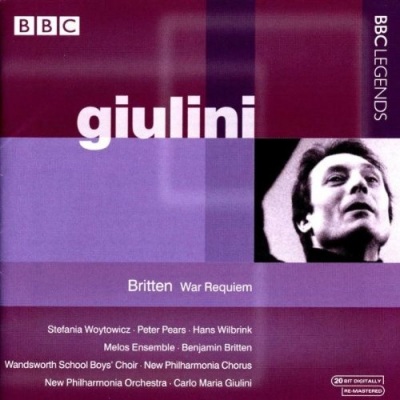
Britten: War Requiem
Gramophone Classical Music Guide 2010 “This performance is a revelation. As the authoritative note makes clear, Britten and Giulini had a mutual respect for and an admiration of each other's work. Here they combine to give a performance that's a true Legend, as this BBC series has it. Giulini's reading is as dramatic and viscerally exciting as any rival version. The music leaps from the page new-minted in his histrionically taut hands, the rhythmic tension at times quite astonishing. For instance, the sixth movement, 'Libera me', is simply earth-shattering in its effect, every bar, every word, every instrument sung and played to the hilt – and so it's throughout, with the live occasion added to the peculiar, and in this case peculiarly right, acoustics of the Albert Hall adding its own measure of verité to the inspired occasion. The performance of the New Philharmonia forces, under the man who was at the time their favourite conductor after Klemperer, is at once technically assured and wholly dedicated. Only perhaps the classic Decca recording comes near equalling it in this respect, and that doesn't quite have the electrifying atmosphere, found on this astonishing occasion. Nor have the Wandsworth Boys' Choir, placed up in the Hall's gallery, been surpassed. The soloists also seem to realise the special quality of the occasion. Pears surpasses even his own creator's reading on the Decca set, singing with the sustained concentration and vocal acuity that were so much his hallmarks in Britten's music. The soprano Stefania Woytowicz, who at the time made something of a speciality of this work, has very much the vocal timbre of Vishnevskaya, for whom the part was written, and perhaps a shade more sensitivity. She's certainly the best soprano on any version, and Wilbrink comes near being the best baritone. He may not be quite as varied or subtle as Decca's Fischer- Dieskau, nor as confident as Chandos's Shirley- Quirk, but he has a more beautiful voice than either, with a plangency in his tone that's so right for this music. Most of all it's the sum of the parts that so impresses here, as does the truthfulness of the sound, preferable to that on the Chandos set.”
